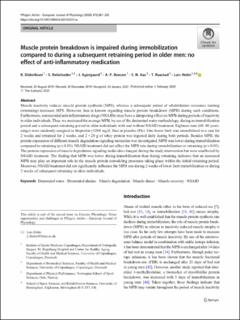Muscle protein breakdown is impaired during immobilization compared to during a subsequent retraining period in older men: no effect of anti-inflammatory medication
Dideriksen, K.; Reitelseder, Søren; Agergaard, J.; Boesen, A.P.; Aas, Sigve Nyvik; Raastad, Truls; Holm, Lars
Peer reviewed, Journal article
Published version
Permanent lenke
https://hdl.handle.net/11250/2725511Utgivelsesdato
2020Metadata
Vis full innførselSamlinger
- Artikler / Articles [2119]
- Publikasjoner fra Cristin [1107]
Originalversjon
Pflügers Archiv: European Journal of Physiology. 2020, 472(2), 281-292. 10.1007/s00424-020-02353-wSammendrag
Muscle inactivity reduces muscle protein synthesis (MPS), whereas a subsequent period of rehabilitation resistance training (retraining) increases MPS. However, less is known regarding muscle protein breakdown (MPB) during such conditions. Furthermore, nonsteroidal anti-inflammatory drugs (NSAIDs) may have a dampening effect on MPB during periods of inactivity in older individuals. Thus, we measured the average MPB, by use of the deuterated water methodology, during an immobilization period and a subsequent retraining period in older individuals with and without NSAID treatment. Eighteen men (60–80 years: range) were randomly assigned to ibuprofen (1200 mg/d, Ibu) or placebo (Plc). One lower limb was immobilized in a cast for 2 weeks and retrained for 2 weeks, and 2 × 20 g of whey protein was ingested daily during both periods. Besides MPB, the protein expression of different muscle degradation signaling molecules was investigated. MPB was lower during immobilization compared to retraining (p < 0.01). NSAID treatment did not affect the MPB rate during immobilization or retraining (p > 0.05). The protein expression of muscle degradation signaling molecules changed during the study intervention but were unaffected by NSAID treatment. The finding that MPB was lower during immobilization than during retraining indicates that an increased MPB may play an important role in the muscle protein remodeling processes taking place within the initial retraining period. Moreover, NSAID treatment did not significantly influence the MPB rate during 2 weeks of lower limb immobilization or during 2 weeks of subsequent retraining in older individuals.
Beskrivelse
This article is licensed under a Creative Commons Attribution 4.0 International License, which permits use, sharing, adaptation, distribution and reproduction in any medium or format, as long as you give appropriate credit to the original author(s) and the source, provide a link to the Creative Commons licence, and indicate if changes were made. The images or other third party material in this article are included in the article's Creative Commons licence, unless indicated otherwise in a credit line to the material. If material is not included in the article's Creative Commons licence and your intended use is not permitted by statutory regulation or exceeds the permitted use, you will need to obtain permission directly from the copyright holder. To view a copy of this licence, visit http://creativecommons.org/licenses/by/4.0/.
